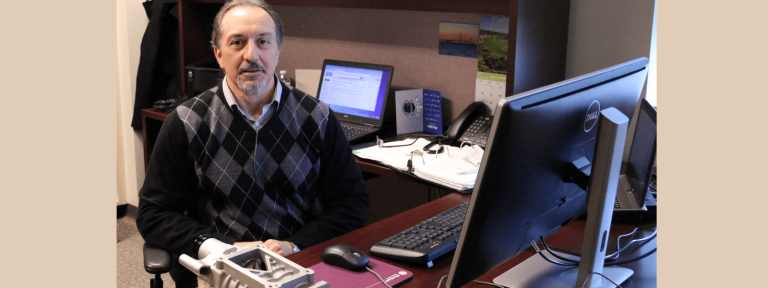
“The fact that it has real world applications really makes us very excited to work on this.”
Kettering University faculty and students are partnering with a company with technology operations in Michigan to improve vehicle fuel efficiency through waste heat recovery.
Dr. Bassem Ramadan, Mechanical Engineering department head at Kettering, began a partnership with Eaton, which has an advanced technology campus located in Southfield, Michigan, in 2013. With the help of grants from the Department of Energy, Ramadan, Kettering graduate research assistants and Eaton engineers, have been researching how to design an efficient expander that can extract mechanical energy from various inlet boundary conditions.
Research is being done on the design for an expander and the rotors inside it. The expander can use either exhaust gases or an organic fluid to spin the rotors and generate power.
Since 2013, and from grants totaling $750,000, Ramadan has had the help of 10 Kettering University graduate research assistants. Currently, two are helping with the research -- Pragya Mishra and Jayneel Gajjar.
Ramadan and the students use Computational Fluid Dynamics (CFD) software to analyze and change the shape and design of the expander porting and its rotors. The software allows them to do flow simulations and calculate the efficiency of different designs before the part is built by Eaton which reduces development time and cost. The ultimate goal is to figure out how they can maximize the efficiency of the device.
Eaton approached Ramadan about four years ago when they realized they needed to increase their analytical capabilities in CFD for advanced research and development projects.
“We knew we needed to increase our capacity and continue to improve capability for exploration of new technologies and adding Kettering’s expertise to Eaton’s projects made sense,” said Matthew Fortini, engineering specialist at Eaton.
The partnership has allowed Eaton to do studies for five different projects to date. The projects look at how the software at Kettering can show them how to optimize their design for efficiency and power generation.
For Kettering students, having the opportunity to work on this research adds experience and knowledge they wouldn’t necessarily get in the classroom, Ramadan said. The CFD technique is tough to learn in a single course. Graduate assistants work with Ramadan for about a year to get a better sense of how it can be effective.
Students are able to relate theory and the actual application of it. Both Mishra and Gajjar have been using CFD for this research for more than a year. The best part of the research for them is seeing the results as they happen and seeing their work be used in practical applications throughout the industry, they said.
“We rely on fluid mechanics principles to analyze the flow. The fact that it has real world applications really makes us very excited to work on this,” Ramadan said.